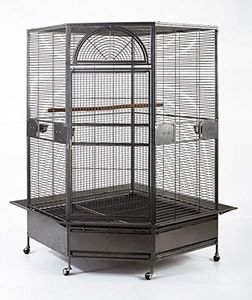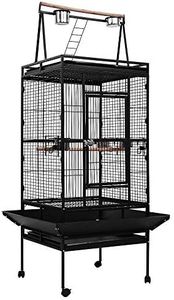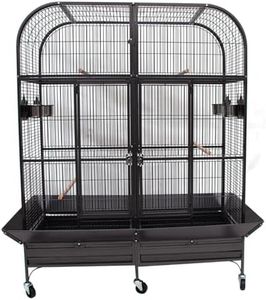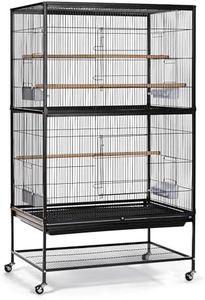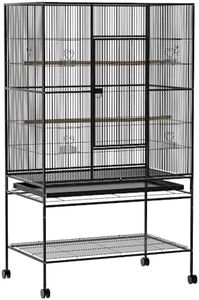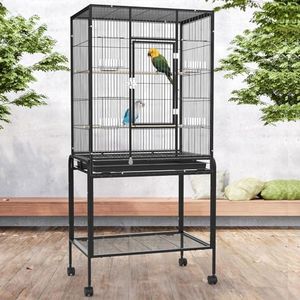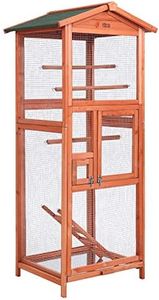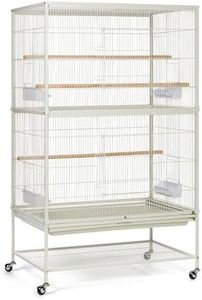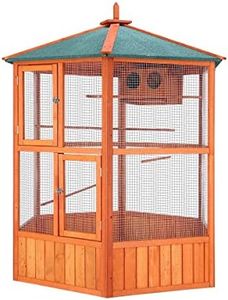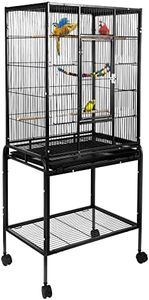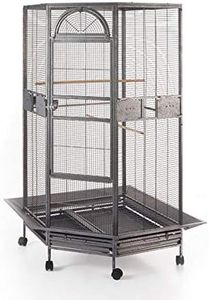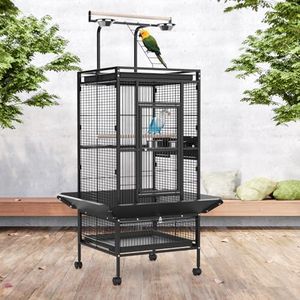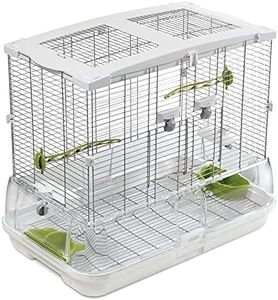We Use CookiesWe use cookies to enhance the security, performance,
functionality and for analytical and promotional activities. By continuing to browse this site you
are agreeing to our privacy policy
10 Best Bird Cage For Conure
From leading brands and best sellers available on the web.By clicking on a link to a third party's website, log data is shared with that third party.
Buying Guide for the Best Bird Cage For Conure
Choosing the right cage for your conure is essential to ensure a comfortable, safe, and healthy environment for your feathered companion. Birds spend a large part of their life inside their cages, so picking the right one will play a big role in their well-being and happiness. When evaluating options, think about the bird’s space needs, how easy the cage is to clean, safety features, and your conure’s daily habits. Understanding the most important cage features will help you select a home that makes both you and your bird happy.Cage SizeCage size is the amount of space inside where your conure will live, fly, and play. This is important because a cage that's too small can make your bird feel cramped and stressed, leading to behavioral and health issues. For conures, cages can range from minimum size (for sleeping only) to large, flight-friendly spaces. If you only let your conure out for a few hours daily, a more spacious cage is better, ideally allowing the bird to flap its wings and hop from perch to perch. Generally, the bigger the cage, the happier and healthier your bird will be. Always focus on width and depth, not just height, since conures like to move side to side. Select the largest cage you can comfortably fit and keep in your space, suited to your bird's activity level and how long they stay in the cage each day.
Bar SpacingBar spacing is the distance between the cage bars. For conures, bar spacing is vital for safety because bars that are too wide may allow your bird to get its head stuck or even escape. Typical suitable bar spacing for conures is about 1/2 to 5/8 of an inch. Anything wider is dangerous, while bars too close together can make the cage feel closed in and might not offer enough climbing options. When choosing bar spacing, always base your choice on the size of your conure’s head; you want the bars close enough to prevent accidental escapes, but wide enough so the bird can comfortably climb and see out.
Cage Material and FinishThe materials and coatings used to make the cage are crucial for your conure’s health and safety. Bird cages are usually made from stainless steel, wrought iron, or powder-coated metal. Stainless steel cages are highly durable, non-toxic, and easy to clean but tend to be heavier. Powder-coated and painted cages are common, but make sure the finish is lead- and zinc-free to avoid poisoning, as birds like to chew on bars. When considering cage material, think about how much your conure chews, how easy the cage is to keep clean, and the overall sturdiness. Always choose a non-toxic, rust-resistant finish for safety and long life.
Ease of CleaningHow simple it is to clean the cage will make a big difference in how happy both you and your conure are. Cages that have features like pull-out trays, grille floors, and easily removable food and water dishes are much easier and faster to keep tidy. Since bird droppings, food debris, and feathers build up daily, a design allowing you to spot-clean often and deep-clean occasionally will help prevent odor and illness. When evaluating ease of cleaning, imagine your weekly routine—look for cages that make this task quick so that it doesn’t become a chore.
Door and Lock SafetyThe design and security of the cage door is important to prevent escapes and accidental injuries. Conures are clever birds that can sometimes figure out simple latches, so secure, bird-proof locks are a must. Doors should be large enough to allow easy access for your hand and for swapping toys or dishes, but not so large that your conure could slip through. Also, check if the doors close snugly and stay shut even if the bird pushes on them. If your conure is especially crafty or curious, pick a cage with more secure, lockable doors.
Perches and Accessories CompatibilityThe cage should be equipped (or have space to add) a good variety of perches and toys that support exercise and prevent boredom. Many cages come with a few basic perches, but it’s important to be able to add or change them to suit your conure’s needs. Check for multiple attachment points on the cage’s bars—this lets you set up an interesting environment with swings, ladders, and chew toys. When evaluating cages, consider how you’ll set up a comfortable space with perches at different heights and textures to keep your conure’s feet healthy and mind stimulated.
